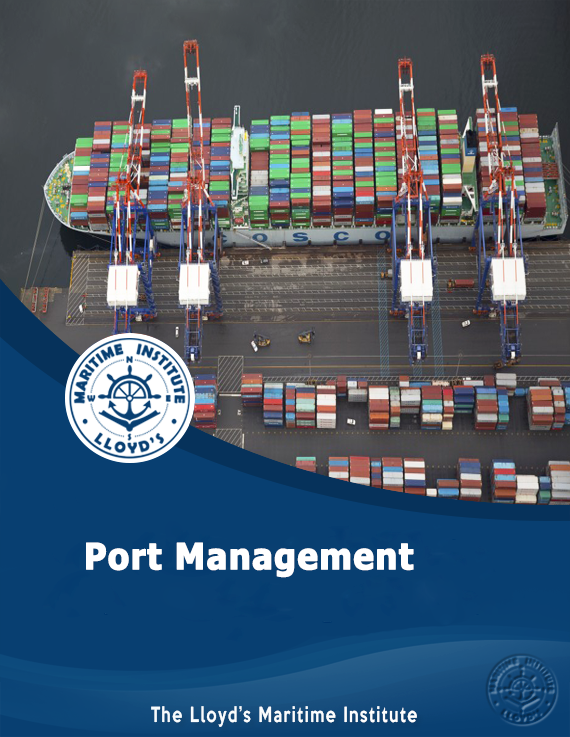
How to Become a Port Management Diploma: Your Career Path
Are you eager to dive into the dynamic world of port management? Imagine a career where you hold the keys to international trade, ensuring goods flow smoothly across the globe.
With a Port Management Diploma, you can transform this vision into reality. This diploma isn’t just a credential; it’s your passport to a thriving sector that plays a pivotal role in global economics. But how do you get started? What steps do you need to take to secure this valuable qualification?
In this guide, you’ll discover the essential path to becoming a port management expert, unlocking opportunities that can redefine your career. Stick with us, and you’ll learn how to navigate this exciting field with confidence.
Port Management Diploma Overview
The Port Management Diploma opens doors to an exciting career. It equips you with essential skills for managing ports efficiently. This qualification is perfect for aspiring port managers. It covers various aspects of port operations and logistics.
Understanding the workings of a port is crucial for success. The diploma provides a comprehensive view of port activities. You will learn about the movement of goods and vessels. Safety and security are also key topics.
Let’s explore the details of this diploma further.
Understanding Port Operations
Port operations involve numerous activities. Loading and unloading cargo, managing vessels, and ensuring safety. Each task requires careful coordination and planning. The diploma teaches you to handle these with efficiency.
Importance Of Logistics In Ports
Logistics plays a vital role in port management. It ensures the smooth movement of goods. The diploma covers supply chain management. You learn how to optimize logistics for better performance.
Safety And Security Measures
Ports must be safe and secure environments. The diploma includes training on safety protocols. It focuses on security measures to protect people and goods. This knowledge is crucial for any port manager.
Environmental Sustainability Practices
Environmental sustainability is increasingly important. The diploma covers eco-friendly practices in ports. You learn to implement strategies that reduce environmental impact. This helps in promoting sustainable port operations.
Key Management Skills
Effective management is key in port operations. The diploma develops your leadership skills. It teaches decision-making and problem-solving techniques. These skills are essential for managing a port successfully.
Skills And Competencies Required
Port management diploma requires strong organizational skills, effective communication, and knowledge of logistics. Problem-solving abilities help manage port operations efficiently. Understanding maritime laws and safety standards ensures smooth functioning.
Embarking on a journey to obtain a Port Management Diploma is a rewarding endeavor. However, understanding the essential skills and competencies required is crucial. This knowledge not only prepares you for success but also sets you apart in this competitive field. Let’s explore the key skills and competencies that can help you thrive in port management.
Technical Knowledge Of Port Operations
A solid grasp of how ports operate is vital. This includes understanding logistics, shipping procedures, and safety protocols. Without this technical know-how, navigating the complexities of port management becomes challenging.
Strong Communication Skills
Effective communication is at the heart of port management. You will interact with diverse teams and stakeholders daily. Clear communication ensures smooth operations and minimizes misunderstandings.
Leadership And Team Management
Can you lead a team under pressure? Strong leadership skills are essential in port management. You need to inspire and manage teams, ensuring everyone works towards common goals.
Problem-solving Abilities
Ports face unexpected challenges regularly. Your ability to think quickly and resolve issues efficiently is crucial. This competency can turn potential crises into opportunities for growth.
Attention To Detail
Port management involves numerous intricate details. Overlooking even a minor aspect can lead to significant disruptions. Cultivating a keen eye for detail is indispensable for maintaining seamless operations.
Adaptability And Flexibility
Ports are dynamic environments. Schedules can change, and unexpected situations arise. Being adaptable allows you to respond effectively and keep operations on track.
Knowledge Of Environmental And Regulatory Compliance
Port managers must ensure compliance with environmental and regulatory standards. Familiarize yourself with these guidelines to avoid legal issues. Staying informed about updates in regulations is equally important.
Financial Acumen
Managing budgets and financial resources is a core responsibility. Understanding financial principles helps you make informed decisions. This skill is crucial for optimizing operations and ensuring profitability. Developing these skills and competencies will not only prepare you for a Port Management Diploma but also equip you for a successful career in the industry. What steps will you take today to start honing these essential skills?
Educational Prerequisites
To pursue a Port Management Diploma, a high school diploma or equivalent is essential. A background in business or logistics is beneficial. Basic computer skills and proficiency in English enhance learning and communication.
Embarking on a journey to earn a Diploma in Port Management requires understanding the educational prerequisites that set the foundation for your future career. Whether you’re fresh out of high school or considering a career change, knowing what educational steps to take is crucial. These prerequisites not only prepare you academically but also mold you into an effective leader in the bustling world of port operations.
High School Education: A Starting Point
Completing high school is your first step. Focus on subjects like mathematics, geography, and business studies. These subjects provide a solid base for understanding logistical and financial aspects of port management.
Relevant Courses In Maritime Studies
Consider enrolling in courses related to maritime studies. Many colleges offer introductory courses that cover shipping logistics and maritime law. These courses give you insights into the industry and prepare you for more advanced studies.
English Proficiency
English proficiency is essential. Ports operate globally, and English is often the common language used in international trade. Enhance your language skills through classes or online resources to communicate effectively in the maritime sector.
Basic Computer Skills
Develop basic computer skills. Port management involves using software for tracking shipments and managing operations. Familiarize yourself with programs like Excel and shipping management software to stay ahead in the tech-savvy environment.
Internships And Practical Experience
Seek internships or part-time jobs at local ports or shipping companies. Real-world experience complements your academic studies and provides a glimpse into daily operations. This hands-on approach makes the theoretical knowledge come alive.
Networking And Industry Connections
Build connections with professionals in the industry. Attend maritime conferences and workshops. Connecting with seasoned experts can provide valuable advice and potentially open doors for mentorship and future job opportunities.
Self-assessment And Personal Goals
Reflect on your personal goals. What aspects of port management excite you? Understanding your interests can guide your educational choices and career path. Whether it’s logistics, operations, or environmental management, aligning your studies with your passions makes learning more engaging. Are you ready to take the plunge into port management? Understanding these educational prerequisites is your first step toward a rewarding career. What steps will you take today to get closer to your diploma?

Choosing The Right Institution
Choosing the right institution for your Port Management Diploma is a pivotal step. Your choice will influence your learning experience and career prospects. It’s essential to make informed decisions to ensure your investment in education pays off.
Accreditation Importance
Accreditation signifies quality and credibility. It’s a stamp of approval from recognized bodies that the institution meets specific educational standards. Without accreditation, your diploma may not be recognized by employers or other educational institutions.
Check if the institution is accredited by relevant industry bodies. This ensures the curriculum aligns with industry needs and standards. An accredited program also often offers better networking opportunities with industry experts.
Program Curriculum
The curriculum should be comprehensive and up-to-date. It should cover essential topics like logistics, supply chain management, and environmental regulations. A well-rounded curriculum prepares you for real-world challenges in port management.
Review course materials and teaching methods. Are they interactive? Do they offer practical experiences like internships or projects? These experiences can be invaluable in applying theoretical knowledge.
Ask yourself: Does the program align with your career goals? If you’re aiming for a specific role, ensure the curriculum covers relevant skills and knowledge. Your educational journey should be a stepping stone toward your dream job.
Application Process
To pursue a Port Management Diploma, start by researching institutions offering the course. Gather necessary documents like transcripts and identification. Submit your application, ensuring all information is accurate. Follow up with the admissions office for updates.
Embarking on the journey to secure a Port Management Diploma can be both exciting and daunting. The application process is a crucial step that sets the stage for your educational path. Understanding this process can make all the difference in ensuring a smooth transition into your program of choice. Let’s break down the essential components to help you put your best foot forward.
Application Materials
Gathering the right materials is your first task. Most programs will ask for a completed application form, academic transcripts, and letters of recommendation. Each document serves to paint a picture of your academic and professional background. Your personal statement is your chance to shine. Share why port management excites you and what you hope to achieve. Be genuine and specific—it’s often the most compelling part of your application. Don’t forget your resume. Highlight relevant experiences, whether it’s a summer job at a shipping company or a leadership role in a student organization. Every detail counts when showcasing your passion for the field.
Deadlines And Timelines
Timing is everything. Missing a deadline can delay your entire education plan. Most programs have specific application deadlines, often a few months before the start of the course. Create a timeline to keep track of important dates. Set reminders for when to submit your application and request transcripts. This helps avoid last-minute stress and ensures all your materials are in order. Consider applying early if possible. Early applications can sometimes be reviewed sooner, giving you peace of mind and extra preparation time if accepted. What could you achieve with a head start? Approach the application process with confidence and organization. Each step brings you closer to a rewarding career in port management. Are you ready to take the plunge?
Funding And Scholarships
Funding options and scholarships can help in pursuing a Port Management Diploma. Many institutions offer financial aid to eligible students. These resources ease the financial burden, making education more accessible.
Pursuing a diploma in port management can be a transformative step for your career. However, the cost of education might be a concern. Thankfully, there are numerous funding and scholarship opportunities available to ease the financial burden. You can find support tailored to your needs, whether through scholarships, grants, or financial aid. Let’s explore how you can make your education journey more affordable and accessible.
Scholarship Opportunities
Many organizations and institutions offer scholarships specifically for students pursuing maritime studies. These scholarships can cover part or all of your tuition fees. For instance, some maritime associations provide funds to students who demonstrate academic excellence and a passion for the industry. You can also explore scholarships offered by the school or university where you plan to enroll. These may be based on merit, need, or a combination of both. Always check the eligibility criteria and application deadlines. Consider reaching out to alumni networks. Former students often have information about lesser-known scholarships and can offer valuable advice on how to secure these funds. Have you looked into these options yet?
Financial Aid Options
Beyond scholarships, financial aid can be a viable option to fund your port management diploma. Many educational institutions offer financial aid packages that include loans, grants, and work-study programs. Grants are particularly beneficial as they don’t require repayment. They are often need-based, so it’s important to fill out any required financial forms accurately. Student loans are another common option. Ensure you understand the terms and conditions before committing. Interest rates and repayment plans vary, so read the fine print carefully. Have you considered a part-time job or internship in the maritime sector? This not only helps you earn money but also provides valuable industry experience. By exploring these funding avenues, you can focus more on your studies and less on financial stress. What steps will you take today to secure your educational funding?
Internship And Practical Experience
Gain practical experience through internships to become a Port Management Diploma professional. These opportunities provide hands-on skills in port operations and logistics. Enhance your understanding and boost your career in port management.
Internship and practical experience are crucial for anyone pursuing a diploma in port management. These opportunities bridge the gap between classroom learning and real-world application. By gaining hands-on experience, you sharpen your skills and increase your employability in the competitive maritime industry.
Finding Internships
Securing the right internship is a vital step in your port management journey. Start by researching companies and organizations in the maritime sector. Look for those that align with your career goals. Networking is your best friend. Attend industry events, seminars, and workshops to connect with professionals who can guide you toward internship opportunities. Don’t be afraid to reach out directly to companies and express your interest. Online platforms can also be helpful. Websites like LinkedIn or industry-specific forums often list internship openings. Keep your profile updated to catch the eye of potential employers.
Gaining Practical Skills
Internships are your chance to develop practical skills that textbooks can’t teach. Focus on learning the daily operations of a port, such as cargo handling, logistics, and safety regulations. These are essential for a successful career in port management. Seek feedback from your supervisors during your internship. Constructive criticism helps you improve and understand what employers expect in the workplace. Reflect on your experiences. Ask yourself, what skills did you gain today? How can you apply them in future roles? This practice helps you internalize what you’ve learned and prepares you for your next steps. Engage actively in your internship. Volunteer for tasks, ask questions, and show initiative. Your eagerness to learn can leave a lasting impression, potentially opening doors to future job offers.
Career Opportunities
Explore a rewarding career in port management by earning a specialized diploma. Gain essential skills in logistics, operations, and maritime regulations. This qualification opens doors to roles in shipping companies, government agencies, and international trade organizations.
Embarking on a journey with a Port Management Diploma opens a world of career possibilities. The maritime industry is vast and constantly evolving, offering a variety of paths for those with the right skills and education. As you consider this diploma, it’s essential to understand the potential job roles and the industry’s demand for skilled professionals.
Potential Job Roles
With a Port Management Diploma, you can step into numerous exciting roles. Port Operations Manager is a pivotal position, where you’ll oversee daily activities, ensuring efficiency and safety. Logistics Coordinator is another role that requires managing the flow of goods and optimizing transport routes. If you’re drawn to the technical side, consider becoming a Maritime Safety Officer. You’ll ensure compliance with safety regulations and manage risk assessments. Alternatively, as a Customs Officer, you’ll facilitate international trade by ensuring smooth customs processes. Each role offers a unique set of challenges and rewards, perfect for those who thrive in dynamic environments.
Industry Demand
The maritime industry is the backbone of global trade, and its demand for skilled professionals is on the rise. As global shipping volumes increase, ports require efficient management to handle the growing workload. This translates to a higher demand for qualified individuals with expertise in port operations and logistics. You might wonder if this demand is sustainable. The answer is a resounding yes. With advancements in technology and environmental regulations, the industry needs innovative thinkers who can adapt and lead. Your skills will be in demand, providing you with job security and opportunities for advancement. Pursuing a Port Management Diploma not only prepares you for a career but positions you as a valuable asset in a thriving industry. Are you ready to navigate this exciting field?
Networking And Professional Development
Enhance your career in port management with a diploma. Build strong networks by joining industry events and workshops. Develop skills through mentorship and professional courses.
Networking and professional development are crucial in port management. Building connections enhances career growth. Participating in industry events and joining associations opens doors. These activities improve your skills and expand your knowledge. You gain insights into trends and challenges. Let’s explore how industry conferences and professional associations can help.
Industry Conferences
Attending industry conferences is essential. They offer a platform to meet experts. You learn from leaders in port management. Conferences provide valuable information on new technologies. They also highlight current issues affecting the industry. Engaging in discussions boosts your understanding. It helps you identify opportunities for growth. You can share ideas and get feedback from peers. Networking here can lead to potential collaborations.
Professional Associations
Joining professional associations is beneficial. These organizations offer resources and support. They connect you with professionals in the field. Associations provide access to seminars and workshops. You can gain certifications and improve your qualifications. They often offer mentoring programs. These programs help you learn from experienced members. Being part of an association enhances your credibility. It shows your commitment to the profession.

Advancing Your Career
Advancing your career in port management opens new doors. It strengthens your skills and enhances your professional value. A diploma in port management is just the beginning. It sets the foundation for a successful future. Consider further steps to progress in this field.
Continuing Education
Continuous learning is vital for success. Enroll in workshops and seminars. Stay updated with the latest industry trends. Gain knowledge about new technologies. This keeps your skills sharp and relevant. Online courses offer flexibility for busy professionals. Choose courses that enhance your port management skills.
Leadership Opportunities
Leadership roles can advance your career significantly. They develop your ability to manage teams effectively. Take initiative in projects and show commitment. Practice clear communication and decision-making. These are key leadership skills. Volunteer for leadership positions in your organization. This demonstrates your willingness to grow.

Credit: www.facebook.com
Frequently Asked Questions
What Is A Port Management Diploma?
A Port Management Diploma is a specialized program focused on maritime logistics and operations. It equips students with the knowledge to handle port operations efficiently. This diploma covers topics like shipping, cargo handling, and supply chain management. Graduates can pursue careers in port administration, maritime consultancy, or logistics management.
How Long Does It Take To Complete?
Typically, a Port Management Diploma takes one to two years to complete. The duration depends on the educational institution and program structure. Some courses may offer accelerated options or part-time study. It’s essential to check the specific requirements of each program for accurate timelines.
What Are The Entry Requirements?
Entry requirements for a Port Management Diploma vary by institution. Generally, candidates need a high school diploma or equivalent. Some programs may require relevant work experience or specific qualifications. It’s important to review the prerequisites of each course before applying to ensure eligibility.
What Career Options Are Available After?
Graduates of a Port Management Diploma have diverse career options. They can work in port administration, maritime consultancy, logistics, and shipping companies. Other opportunities include roles in supply chain management and cargo operations. These positions offer the chance to work in dynamic and global environments.
Conclusion
A port management diploma opens doors to diverse opportunities. Skills learned are valuable and practical. This diploma enhances your career in the maritime sector. It’s a step towards becoming a skilled port manager. Stay dedicated and focused throughout your studies.
Connect with professionals and gain real-world experience. Remember, hard work pays off. With determination, success in port management is within reach. Keep learning and growing in this dynamic field. Your future in port management is bright and promising. Start your journey today and achieve your career goals.





